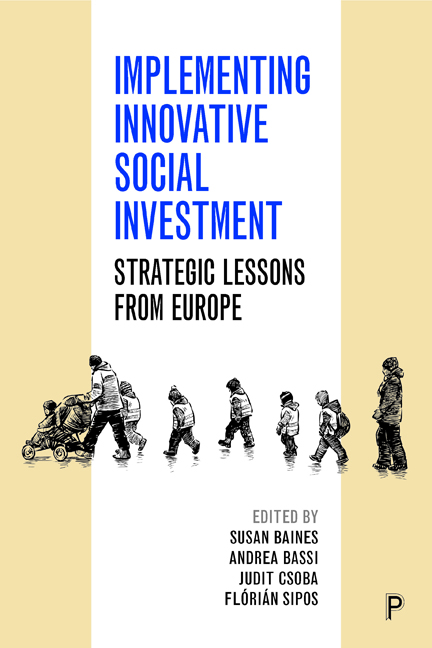Book contents
- Frontmatter
- Contents
- List of tables, figures, images and boxes
- Notes on contributors
- Acknowledgement
- one Social Investment in welfare: a sub-national perspective
- Part A Children and families: early intervention in people’s life courses
- Part B From a caring state to an investing state: labour market activation
- Part C Social solidarity and Social Investment
- Index
three - Troubled Families in Greater Manchester
Published online by Cambridge University Press: 21 April 2022
- Frontmatter
- Contents
- List of tables, figures, images and boxes
- Notes on contributors
- Acknowledgement
- one Social Investment in welfare: a sub-national perspective
- Part A Children and families: early intervention in people’s life courses
- Part B From a caring state to an investing state: labour market activation
- Part C Social solidarity and Social Investment
- Index
Summary
Introduction
Troubled Families in Greater Manchester (GM) is a sub-national implementation of an England-wide programme intended to offer joined-up services targeted at families with multiple needs (eg crime, antisocial behaviour, truancy, unemployment, mental health problems and domestic abuse). The underpinning principles of the programme align with the European Social Investment paradigm through its emphasis on early intervention with children, behaviour change and sustained employment. The funding mechanism is a version of Payment by Results (PbR), a form of outcome-based commissioning (Fox et al, 2018), under which local authorities are paid partly through submitting data to demonstrate that they have met outcomes. Troubled Families has been controversial. The government and some popular media declared it an overwhelming success in ‘turning around’ families (DCLG, 2015) but the national evaluation reported no significant impact. It has been criticised as a policy that individualises societal problems, penalises the socially excluded and justifies cuts in public spending (Levitas, 2012, 2014; Jensen, 2013; Hayden and Jenkins, 2014; Arthur, 2015; Crossley, 2015).
GM is a subregion in the north-west of England, which includes the cities of Manchester and Salford and surrounding towns and villages. There are 10 local authorities in GM, which administer education and social services, housing, roads, and public spaces. In 2012, a number of central government functions were devolved to the Greater Manchester Combined Authority, and a directly elected mayor for GM was first elected in May 2017. The Troubled Families programme in GM was part of the devolution deal (Bate, 2017). There, senior managers see Troubled Families as a catalyst to general public service reform, especially more integrated working across the various services provided directly by the boroughs and contracted to external suppliers, including social economy organisations. The GM approach to reform is underpinned by a set of common objectives:
• A new relationship between public services and citizens, communities and businesses that enables shared decision making, democratic accountability and voice, genuine co-production and joint delivery of services.
• An asset based approach that recognises and builds on the strengths of individuals, families and our communities rather than focusing on the deficits.
• Behaviour change at the community level that builds independence and supports residents to be in control
• A place based approach that redefines services and places individuals, families, communities at the heart
• A stronger prioritisation of well-being, prevention and early intervention
- Type
- Chapter
- Information
- Implementing Innovative Social InvestmentStrategic Lessons from Europe, pp. 43 - 58Publisher: Bristol University PressPrint publication year: 2019



